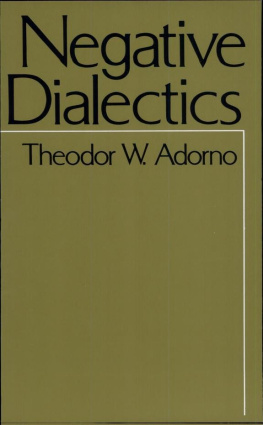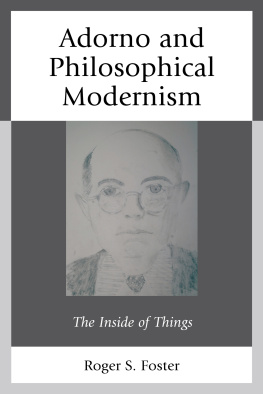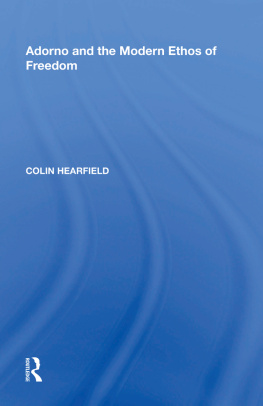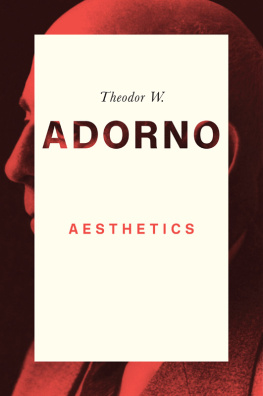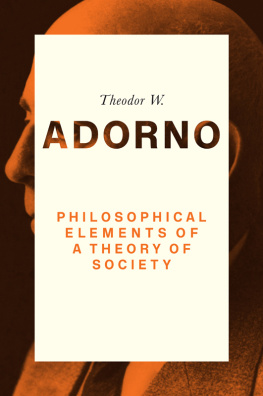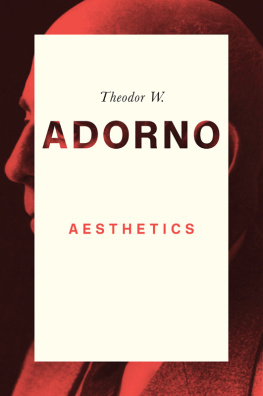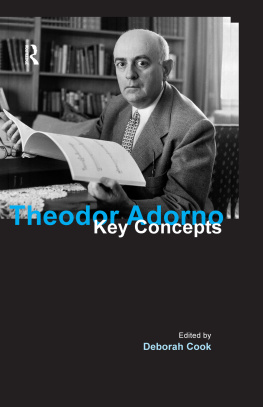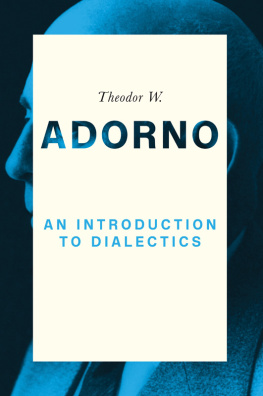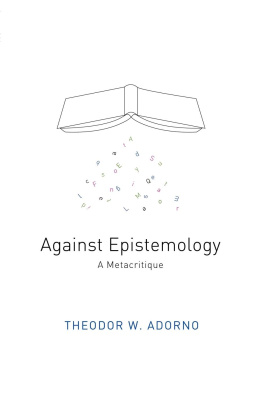Adorno and Existence

PETER E. GORDON

HARVARD UNIVERSITY PRESS
Cambridge, Massachusetts & London, England / 2016
Copyright 2016 by the President and Fellows of Harvard College
All rights reserved
Cover design by Tim Jones
Cover photograph Aaron Foster / Getty Images
978-0-674-73478-4 (alk. paper)
978-0-674-97353-4 (EPUB)
978-0-674-97352-7 (MOBI)
The Library of Congress has cataloged the printed edition as follows:
Names: Gordon, Peter Eli, author.
Title: Adorno and existence / Peter E. Gordon.
Description: Cambridge, Massachusetts : Harvard University Press, 2016. | Includes bibliographical references and index.
Identifiers: LCCN 2016011712
Subjects: LCSH: Adorno, Theodor W., 19031969. | Kierkegaard, Sren, 18131855. | Frankfurt school of sociology. | Existentialism.
Classification: LCC B3199.A34 G67 2016 | DDC 193dc23
LC record available at http://lccn.loc.gov/2016011712
For L.
you must say words, as long as there are any
SAMUEL BECKETT, The Unnamable
Contents
For many years my ambition of writing a book-length study of Adorno remained unrealized, chiefly because it seemed to me improper to devote attention to a thinker for whom I felt such admiration. Some scholars no doubt prefer the celebratory mode. They write books about those they consider heroes, and they draw nourishment from the feeling of narcissistic union with their subjects. If they write about villains, their antipathy is no less intermingled with pleasure. All too often prosecution is a photographic negative for self-affirmation. In either case, one knows where one stands. I have rarely permitted myself this kind of moral rectitude, nor have I longed for the terra firma of absolute certainty in matters of philosophical argument. Critical of all immediacy, and suspiciouson both moral and political groundsof intellectual cathexis, I did not feel I could permit myself to write a sustained monograph about Adorno because (to play upon the obvious pun) I feared that I adored him rather too much. Criticism is a scholarly virtue; love is not.
My reluctance was no doubt overdetermined by an important bond between teacher and student: Martin Jay, the scholar who served as a major guide at the University of CaliforniaBerkeley into modern European philosophy and social thought, made his academic debut as an expositor of critical theory. In 1984 Jay dedicated a monograph to Adorno in the Modern Masters series (then edited by Frank Kermode), a work that only extended a reputation that was at that point already well established. Jays very first book, The Dialectical Imagination, was first published in 1973, and it now occupies a canonical place in the Anglophone world; it remains the most judicious and reliable introduction to the ideas and history of the Institute for Social Research. It is a remarkable fact that Jays book first took shape as a doctoral dissertation (submitted, as it happens, to the very institution where I now hold a professorial appointment). The enduring strength of that early work only compounds my admiration for its author, but it may also help to explain my reluctance to write an independent monograph on similar themes. Prudence counseled me long ago to avoid playing the role of apprentice to an acknowledged master; we all know how Goethes story ends. Rather than risk a similar fate, I sought fallow ground instead, and tilled the soil there.
In two previous monographs, and in various published essays, I have focused my attention on themes of existentialism and religion. I have also written about Martin Heidegger, though never as a philosophical partisan and never from a position of identification or advocacy. But for some time now the urge to work on Adorno has grown more powerful, and, after many years of avoiding the inevitable, the inevitable could no longer be avoided.
My aim in this book is to examine the ways in which Adorno became preoccupied with not only Heidegger but also the broader tradition that often goes (misleadingly) by the name existentialism. It is well known that Heidegger in particular was a constant presence throughout Adornos philosophical career. In Adornos inaugural lecture in May 1931 as a professor of philosophy at the University of Frankfurt, the German philosopher is singled out for special criticism, and from that point forward Heidegger was rarely absent from Adornos reflections. But Heidegger was not the only one. Kierkegaard, often considered the founder of existentialism, was the subject of Adornos habilitation, which the young philosopher completed in early 1933 just as the Nazis were coming to power. Adorno would revisit Kierkegaards philosophy at significant junctures in his career, first in exile and once again after his return to Germany. Nor can we neglect Edmund Husserl, whose phenomenology was the topic of two major efforts, Adornos first dissertation in the 1920s, and a second major philosophical work that he first undertook at Oxford University in the mid-1930s and published with significant revision in 1956. Although the inclusion of Husserl in this philosophical constellation may strike the reader as somewhat surprising, a careful examination of Adornos critique demonstrates that transcendental and existential phenomenology stood together as variants of the same bourgeois-idealist tradition. This book unites into one study Adornos readings of three philosophers: Kierkegaard, Husserl, and Heidegger. All three, I suggest, were exemplars of what I will call the philosophy of bourgeois interiority.
Just what this term signifies and how exactly it applies to the aforementioned philosophers will be addressed later in the book. For the time being it should be acknowledged that Adornos readings may tell us less about these three authors than they do about Adorno as a philosopher and social theorist. The reconstruction of his critical engagements may therefore serve as a via negativa toward a better understanding of Adorno himself. To explain this point will be the chief burden of my book. To anticipate, I will argue that Adorno saw in existentialism a paradigmatic but unsuccessful attempt to realize what would become his own philosophical ambition, to break free of the systems of idealism and to turnin the phrase made famous by Jean Wahltoward the concrete. In his 1931 inaugural lecture Adorno already announced the themes that would remain his abiding philosophical concerns: the polemic against idealism and an appeal to what is irreducible. Toward the end of his career, in the preface to Negative Dialectics, Adorno affirmed this continuity in his thinking: To use the strength of the subject to break through the fallacy of constitutive subjectivitythis is what the author felt to be his task ever since he came to trust his own mental impulses. The similarity is remarkable: what philosophers in the opposed tradition had called the leap into existence might be compared to what Adorno called the primacy of the object. To be sure, these two themes are not identical. But understanding their differences may alert us to a remarkable philosophical proximity that continued to be a source of both inspiration and provocation for Adorno throughout his life.
This project has awakened the old anxiety: Could I write about Adorno without lapsing back into scholarship in the celebratory mode? Could I devote a monograph to Adorno without reducing myself to the role of a mere amanuensis for his ideas? Could a scholar in the school of critical theory ever be other than an eternal student or an uncritical advocate? Such questions cannot be lightly dismissed. And yet, as this project has further developed, I have come to understand that my admiration for Adorno, however strong, is hardly absolute. It serves not as a resting place but as a


